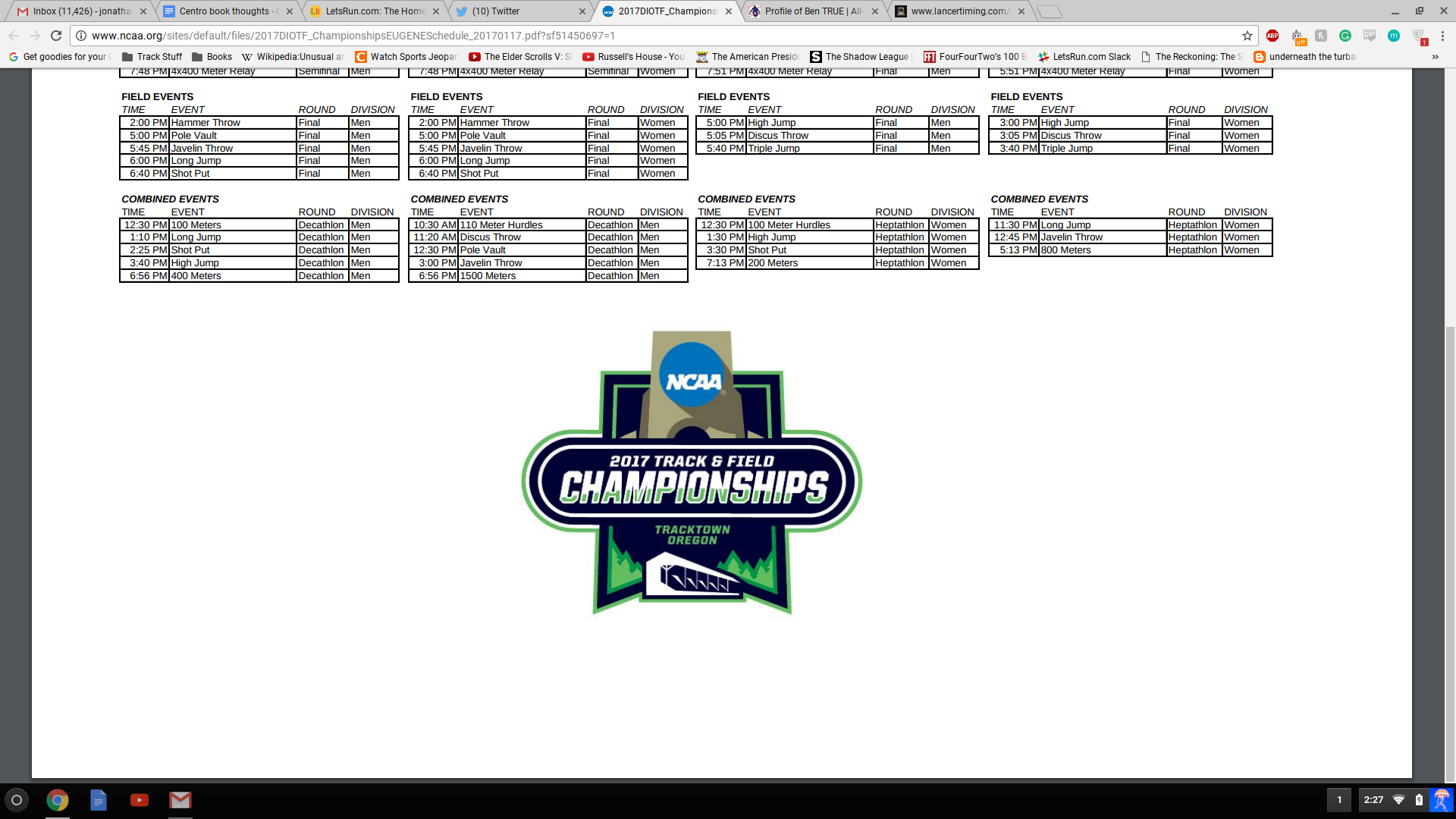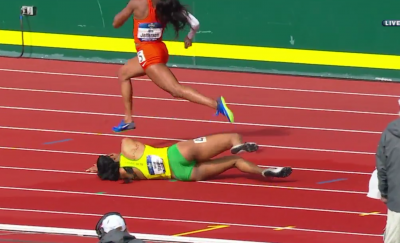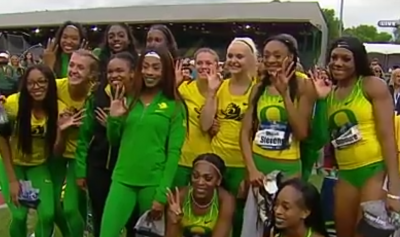From Choke to Clutch: Oregon Ducks Complete First Triple Crown With NCAA Record in 4×400
By Jonathan Gault
June 10, 2017
EUGENE, Ore. — Nobody ever said making history was easy.
In a thrilling final day of the 2017 NCAA Outdoor Track & Field Championships at Hayward Field, the University of Oregon became the first NCAA women’s program to win national titles in cross country, indoor track and outdoor track in the same academic year. A month ago, the sweep seemed pre-ordained, but a series of mishaps — none stranger than the heavily-favored Deajah Stevens’ tumble in the 200 meters — meant that the Ducks had to win the final event, the 4×400 relay, in order to complete the triple crown. Any other outcome would result in a victory for the Georgia Bulldogs, who were looking to make some history of their own by winning the first title in program history.
In and of itself, the women’s 4×400 relay promised to be a special event. At the NCAA indoor meet three months ago, USC’s Kendall Ellis nipped Oregon’s Raevyn Rogers at the line, 3:27.03 to 3:27.07, as both schools broke the collegiate record. Once again, Ellis and Rogers would duel on the anchor leg.
Rogers had already won won her third straight 800-meter crown earlier in the meet, but she now faced a monumental challenge in Ellis, who had run 50.45 earlier this year and taken third in the individual 400. But unlike indoors, Rogers received the baton in first place at the final exchange as the standing crowd of 12,992 partisan Oregon fans screamed from the Hayward Field bleachers. Ellis and USC were just .36 behind, however, and disaster looked to have struck only 50 meters into the anchor leg as Rogers inexplicably allowed Ellis to pass her on the inside of the first turn.
And then? This happened:
This is what track is all about!! Here's the final leg of the 4×4 that decided the national title. What. A. Finish! ?? @OregonTF pic.twitter.com/2yi8Jm4BY3
— ESPNU (@ESPNU) June 11, 2017
49.77 anchor split? Check.
3:23.13 collegiate record? Check.
Triple crown? Check.
In its storied history, Hayward Field has seen plenty of dramatic moments. This one ranks right up there, with Rogers cementing her legacy as an all-time Oregon legend and sending a packed crowd into a state of delirium to give the Ducks the national title and a historic triple crown, 64-62.2 over Georgia.
When it was all over, Oregon head coach Robert Johnson said it best.
“Is that a way to end a freakin’ track meet or what?”
***
The triple crown bid almost died before it was born, in the grass fields of Terre Haute, Indiana. Way back in November, the Oregon women’s cross country team nipped Michigan by a single point to win the national title. And even that narrow victory never would have happened had the Ducks’ Maggie Schmaedick not passed the Wolverines’ Jaimie Phelan at the finish line as Schmaedick edged Phelan by one-tenth of a second. (Phelan’s year turned out okay: she won the NCAA 1500 title on Saturday).
After the Ducks cruised to the indoor title in March with a meet-record 84 points, they headed into the outdoor season as the odds-on favorites to achieve the sweep. Then the troubles began.
It started at the West regional, where the collegiate-record-setting 4×100 relay was disqualified and NCAA 60-meter champion Hannah Cunliffe was forced to withdraw due to injury. That cut the Ducks’ margin for error in Eugene, but the Track & Field News formchart still had Oregon as 22-point favorites even without Cunliffe and the 4×100.
Once the meet began, it was a battle all the way. On Thursday, star sprinters Ariana Washington and Deajah Stevens looked rusty in the 100 and had to rely on a friendly tailwind to earn the two time qualifiers to Saturday’s final.
The 200 is where things really began to go off the rails. Coming down the home stretch, Stevens and Florida’s Kyra Jefferson were neck-and-neck. Throughout the year, Stevens, a 2016 Olympic finalist at 200 meters, had been unchallenged in her specialty event, but Jefferson — who broke a 28-year-old NCAA record by running 22.02 — forced her to dig deeper than ever before and as exhaustion began to set in, Stevens shockingly lost her balance and fell to the track with just 15 meters remaining. Stevens lay on the ground before Washington, who finished second in the race, came back to help her to her feet. This was ruled as illegal assistance, resulting in a DQ for Stevens, rather than a DNF — an important distinction, as it turned out. Stevens later came back to run a leg on 4×400, and had she been a DNF instead of a DQ, she would have been ineligible to compete in that race without receiving medical clearance.
Amazingly, after making the Olympic final, Stevens scored a grand total of zero points in the 200 across two NCAA championships this year as she was also DQ’d for a lane violation at NCAA indoors.
Stevens’ unexpected DQ opened the door for Georgia, and the Bulldogs took full advantage, following up a 1-2 finish in Thursday’s long jump with another 1-2 in Saturday’s high jump and wins in the triple jump (Keturah Orji) and heptathlon (Kendell Williams). Oregon could have helped itself with points in the 5,000, but despite running 2-6 at the bell, Samantha Nadel and Lilli Burdon faded to 8th and 9th by the finish, giving the Ducks just one point and setting the stage for an epic finish in the 4×400.
Quick Take: This was track & field at its finest
What a track and field meet. Between Oregon’s stumbles, Georgia’s big meet, the stakes (an unprecedented triple crown) and the record-setting finale, the final day of NCAAs was action-packed and drama-filled. Thank you to all of the athletes for creating such a special competition.
Quick Take: More accurately, this was Oregon track vs. Georgia field
One of the oddities of our sport: Oregon won the NCAA title without scoring a single point in the field events and Georgia took second without scoring a single point on the track. It still made for a compelling competition, though.
Quick Take: The meet didn’t conclude without controversy
There was a delay between the conclusion of the 4×400 and the trophy presentation as Johnson said that Georgia protested both the 200 meters (arguing that Stevens was ineligible to come back and run the 4×400) and the 4×400 (that Oregon impeded USC). Neither protest was granted, but Johnson said that it was a bit of a letdown for his athletes to have to wait for officials to rule on their title.
“The only bad, disappointing part of it is just the long delay there with the protest,” Johnson said. “…My thing that, once again, that is a little spoiling for such a great moment: it is hard to file a protest when there is no yellow flag. You can file a protest when there is a yellow flag but there was no yellow flag in that 4×400 so gotta do a little better job for us and knowing those little nuances so we don’t rob those girls and those student-athletes of such a great moment.”
Johnson admitted that Georgia coach Petros Kyprianou was within his rights to protest, though he said that the 15-minute protest window had expired when Georgia protested the 200.
“It’s part of the game,” Johnson said. “Everybody protests, and that’s why you pay your $50 and go and do it. There’s no harm, no foul…He’s well within his rights to go and protest, and he should have.”
Deajah Stevens Talks About Team Title, Fall
Discussion: GEORGIA ROBBED!
Full coverage in our 2017 NCAA Special Section.
Editor’s note: The original version of this story said that Maggie Schmaedick and Jaimie Phelan recorded the same time at NCAA XC. In fact, Schmaedick’s official time was 20:38.1 to Phelan’s 20:38.2.





